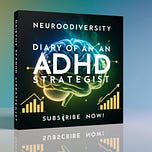I had this conversation with Neena Perez the other day for a podcast episode (which we finally recorded after I'd rescheduled twice—classic me with time management).
We were talking about neurodiversity, ADHD, dyslexia, and honestly?
It was one of those conversations that leaves you feeling properly seen.
Which doesn't happen often, I'll tell you that.
💭 Should I even be sharing these thoughts? Is this too personal? Too revealing? Whatever, it's my journal, and I promised myself I'd be more authentic this year.
Telling People "You're Not Broken" (While Still Convincing Myself)
It's funny how easily I can say to others, "You're not broken. You're just different." I've said it to coaching clients, friends, podcast listeners—probably said it about 137 times in the past year alone. And every time, I mean it completely.
But applying it to myself? That's a whole different battle, isn't it?
I tell people that getting diagnosed with ADHD and dyslexia can be "quite lucky" (yes, actually used those words—perhaps not the most sensitive phrasing, but I meant it). Because finally having an explanation for why your brain works the way it does—it's liberating. Genuinely liberating.
Before my diagnosis, I just thought I was rubbish at certain things. Full stop.
💬 "Eli, you need to try harder with your reading." (Every teacher I had until age 15)
💬 "Why can't you just remember simple instructions?" (My first boss, who definitely thought I was taking the p*ss)
And my personal favourite:
💬 "Are you even listening to me?" (Literally everyone in my life at some point)
The Great Mask: A Masterclass in Appearing "Normal"
I've become bloody brilliant at masking. An absolute master. If they gave out awards for "Best Performance as a Neurotypical Person," I'd have a shelf full.
I've developed these elaborate systems to compensate for my memory issues—alarms on my phone, colour-coded notebooks, voice memos that I sometimes remember to listen to. I've practiced conversations ahead of time. I've learned exactly how to fake my way through social situations where my brain is actually buzzing with either complete overwhelm or total boredom (with absolutely no in-between).
I've become so good at hiding my speech difficulties that most people have no idea. They don't see the mental gymnastics happening as I rephrase sentences on the fly to avoid words I might stumble over.
As I told Neena, the problem with masking is that when you mask, you're not allowing others to truly connect with you. They're connecting with this carefully constructed version that you've designed to be acceptable. To appear "normal." To not stand out for the "wrong" reasons.
💭 And it's exhausting. Like running a background program that uses 90% of your processing power, all day, every day.
Leading While Different
Here's what I've realised, though, and what I talked about with Neena: many successful leaders are dyslexic and have ADHD. Many entrepreneurs share these traits.
It's not a coincidence.
We've had to adapt our entire lives. We've had to find workarounds, alternative approaches, creative solutions. We've had to think differently because the standard ways of doing things often don't work for us.
And those skills—adaptability, creative problem-solving, thinking outside conventional structures—are exactly what makes for innovative business leaders.
The irony isn't lost on me that the very traits that made school a nightmare are the same ones that give me an edge in business. That the differences I tried so hard to hide are actually my greatest strengths.
Living on My Feet
I mentioned to Neena how we both have the ability to have conversations without preparation. We can just show up and talk (probably too much, if I'm honest) because we've had to "live on our feet" our entire lives.
When your memory works differently, when your processing works differently, you develop this ability to adapt in real-time. To think on your feet. To connect dots in the moment.
It's like having a superpower that was forged in the fire of necessity. Born from all those times I forgot the plan, lost my notes, or had to improvise my way through a situation.
💭 Although it would be nice if this superpower came with the ability to remember where I put my car keys. Currently on search attempt #3 today.
The Journey to Self-Acceptance (Still in Progress)
I've told many clients that if you don't accept yourself, other people won't accept you either. That if you don't like who you are, you can change it, but you have to start from a place of acceptance.
And I believe that. I genuinely do.
But it's still a daily practice for me. Some days are better than others.
Some days I feel the strength in my different perspective, in my ability to spot patterns others miss, in my creative approach to problem-solving, in my empathy from having navigated a world that wasn't built for my brain.
Other days? Other days I still get frustrated when I have to read the same paragraph four times. When I lose track of a conversation because my brain decided that the pattern on the carpet was suddenly the most interesting thing in the universe.
When I forget something important despite all my systems and strategies.
But I'm getting better at showing myself the same grace I encourage in others.
Breaking Free from People-Pleasing
One of the most important things I've learned—and what I tried to convey in my conversation with Neena—is that acceptance is the antidote to people-pleasing. When you accept yourself, truly accept yourself, you become less concerned with others' judgment.
I spent years as a people-pleaser, desperate for approval, for validation that I was "good enough" despite my differences. I would bend over backwards to accommodate others, to meet their expectations, to appear "normal" by their standards.
But the more I've come to accept my neurodivergent brain, the less I feel the need to please everyone. I can set boundaries. I can ask for what I need. I can be upfront about my strengths and challenges.
💭 Still working on this one, if I'm honest. Old habits and all that.
The Radical Act of Being Different
At the end of our conversation, Neena and I agreed that accepting your neurodivergence isn't just good for your mental health—it's essential for success as an entrepreneur and for living an authentic life.
Because when you're constantly trying to fit into a mould that wasn't designed for you, you're using up all your energy just to appear "normal." But when you accept your different brain, you can channel that energy into actually creating, building, connecting, leading.
I'm not broken. I'm different. And different is exactly what the world needs.
I've stopped trying to fix myself and started focusing on creating environments where my brain can thrive. Where my different perspective is valued. Where my neurodivergent traits are seen as assets rather than liabilities.
And that, I think, is the real transformation. Not changing who you are, but changing how you see who you are.
From broken to different. From flawed to unique. From less-than to just-as-valuable-but-different.
💭 Bloody hell, this got philosophical quickly. But then again, that's my brain for you—always making connections, always digging deeper. It's exhausting sometimes but I wouldn't trade it. Not anymore.














Share this post